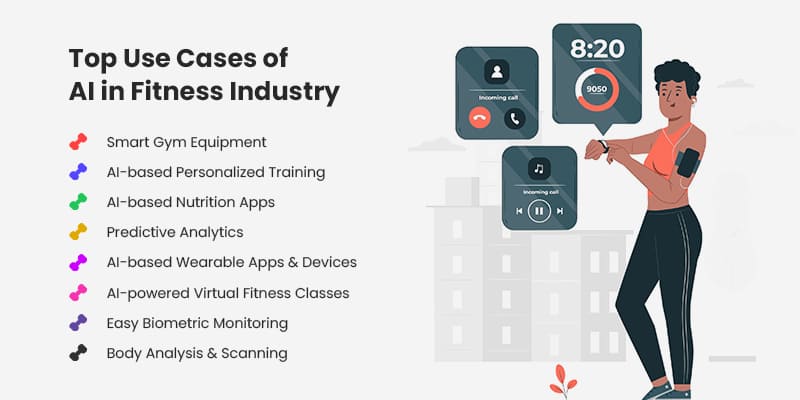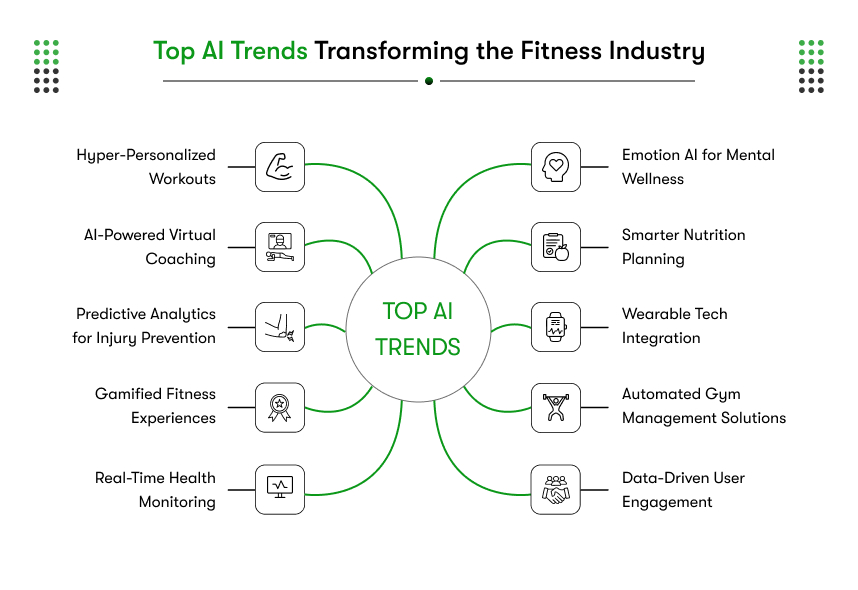The emergence of AI wellness technologies poses new challenges in innovation… Recent advancements in artificial intelligence (AI) have fundamentally altered how individuals approach health and fitness, creating unprecedented opportunities for personalized wellness management. This comprehensive research, conducted by CLOXLABS, explores the transformative impact of AI technologies on workout regimens, dietary planning, and wellness monitoring systems. The integration of machine learning algorithms with health data has enabled a shift from generalized fitness recommendations to highly customized solutions tailored to individual physiological profiles, preferences, and goals.
NOTE: This is an official Research Paper by “CLOXLABS“
The Evolution of AI-Enhanced Wearable Technology
The fusion of AI and wearable technology has ushered in a new era of self-health tracking. Newer generation wearables are way more advanced than simple pedometers, they are now able to function as advanced health companions that monitor and track complex physiological data. These devices consist of electronic sensors affixed to the body that constantly collect relevant health information such as fitness activity, heart rate, electrocardiogram, and blood pressure1. The information collected becomes the basis for Artificial Intelligence algorithms to detect patterns and form recommendations.
Wearable Technology — From Data Tracking to holistic health management systems Earlier devices offered crude metrics, yet modern AI-powered gadgets offer multi-dimensional views of several health variables at once. The unassuming Alter mirror is an example of this evolution, serving not just as a reflective surface but as an intelligent coaching platform that connects genetic biomarker analysis with real-time exercise form correction through ASENSEI’s motion recognition tech.

AI algorithms improve these wearable systems by recognizing existing patterns and turning physiological data into valuable health information. The technology can notice health problems that humans may miss by spotting changes in user metrics before the obvious symptoms appear. The exposure of machine learning models to larger datasets improves their accuracy continually, facilitating increasingly precise assessments and recommendations regarding one’s health. This is a dramatic change from “wait until something happens” to a more proactive approach to health and prevention where users can manage prospective problems before they escalate into serious issues.
The integration of multiple data sources represents another critical advancement in AI-enhanced wearable technology. Modern systems can synthesize information from various devices and platforms, creating a comprehensive health profile that encompasses physical activity, sleep quality, stress levels, and nutritional intake.
Personalized Workout Regimes Through AI Analytics
The application of artificial intelligence to fitness training has fundamentally transformed how individuals approach physical exercise. Traditional workout programs typically offered standardized routines that failed to account for individual differences in physiology, fitness levels, and personal preferences. In contrast, AI-powered fitness applications utilize machine learning algorithms to analyze user data on an individual basis, creating workout plans precisely calibrated to each person’s unique characteristics.
AI-driven fitness platforms like EvolveAI, Fitbod, and FitnessAI represent the cutting edge of personalized workout technology, offering features that range from customized exercise selection to real-time form correction. These applications continuously analyze user performance data, identifying patterns that inform adjustments to workout intensity, volume, and exercise selection. The adaptive nature of these systems enables them to modify recommendations based on progress tracking, ensuring that training stimuli remain optimally challenging as fitness levels improve. This dynamic adjustment process mimics the expertise of a personal trainer while providing the convenience of on-demand access.
The effectiveness of AI in fitness applications extends beyond mere exercise prescription to encompass motivational psychology. Research indicates that key factors driving user engagement with these platforms include accessibility, personalization, interactivity, and comprehensive progress tracking capabilities.
The integration of AI with fitness technology has demonstrated significant impacts on physical activity levels and overall quality of life. User surveys and statistical analyses indicate that individuals utilizing these technologies experience measurable improvements in consistency and effectiveness of their exercise routines. This technology-enhanced approach to fitness is particularly valuable in contexts where access to professional fitness guidance is limited by geographical or economic constraints. As AI systems continue to evolve, they increasingly narrow the gap between algorithmic recommendations and the intuitive guidance provided by experienced human trainers.
All Ads on this website are served by GOOGLE
AI-Driven Nutrition and Dietary Planning
Artificial intelligence has revolutionized nutritional science and dietary planning by creating systems capable of generating highly personalized meal recommendations based on individual health profiles. Contemporary AI nutrition platforms leverage deep generative models to analyze complex relationships between anthropometric measurements, medical conditions, and nutritional requirements. This sophisticated approach enables the creation of dietary recommendations that extend beyond simple calorie counting to address comprehensive nutritional needs, food preferences, and health objectives.
Recent innovations in AI-based nutrition systems have focused on aligning algorithmic recommendations with established nutritional guidelines. A notable development in this field involves the implementation of novel loss functions within deep generative networks, ensuring that AI-generated meal plans conform to scientifically validated nutritional principles.
The technical architecture of advanced nutritional AI systems typically incorporates variational autoencoders that model user characteristics within a descriptive latent space. This approach enables robust representation of individual profiles that account for multiple variables simultaneously, including metabolism, food sensitivities, and specific health conditions. Complementary optimization algorithms further refine meal quantities based on precise energy requirements, ensuring that recommended plans align with individual metabolic needs. This mathematical precision in nutrition planning represents a significant advancement over conventional approaches that rely on broad demographic categories.
A particularly powerful aspect of AI-driven nutrition systems is their capacity for meal diversity and adaptability. Integration with natural language processing technologies like ChatGPT has expanded the repertoire of available meal options across various cuisines and dietary preferences.
The Convergence of IoT, AI, and Wellness Technologies
IoT architecture combined with artificial intelligence has introduced limitless possibilities for health care supervision and intervention. The synergistic twinning of this technology has developed ecosystems that are closely knit and allow for an uninterrupted data stream from wearable gadgets, smart household appliances, medical facilities, and analysis systems. These networks that have been set up enable uninterrupted supervision of health in different aspects at the same time, giving a complete picture of the individual’s wellbeing regarding his movements, bodily activities, his surroundings, and his behavior, so much faster than you can even imagine.

Machine learning serves as a critical analytical tool within IoT health networks, extracting meaningful patterns from massive datasets that would otherwise remain obscured. The technology grants these systems the capability to identify subtle correlations between various health parameters, environmental factors, and behavioral choices. This analytical depth enables predictive modeling of health outcomes based on current metrics and behaviors, allowing for proactive interventions before problems manifest as serious conditions. The predictive capacity of these systems continues to improve as they process expanded datasets, creating increasingly accurate models of individual health dynamics.
The application of IoT and AI has transformed the concept of tele-exercise, enabling remote fitness engagement that maintains personalization and effectiveness. Smart devices equipped with motion sensors, biometric monitors, and interactive interfaces allow fitness professionals to guide and monitor exercise sessions despite physical separation from clients. This technological approach has become particularly relevant as population habits have shifted toward home-based activities. The philosophy underlying these systems acknowledges changing social patterns: “If individuals no longer go to exercise, the exercise must go to their homes instead”.
The year 2024 has witnessed the emergence of five key AI-driven wellness trends that highlight the maturation of these technologies. These developments include advancements in personal health management through increasingly sophisticated wearables, hyper-personalization of wellness services, biotechnology integration, operational efficiency enhancements across wellness sectors, and heightened attention to ethical frameworks governing AI in healthcare applications. These trends collectively demonstrate AI’s transformative impact across multiple industries related to health and wellness, establishing new paradigms for personalized care delivery and health optimization.
Future Directions and Ethical Considerations in AI Wellness
It seems that artificial intelligence’s current trajectory toward health and fitness technologies suggests that such technologies will be effortlessly incorporated into daily life. Research from CLOXLABS suggests that the advancement of technology will focus more on ‘knowledge logging’ – the logging and tracking of information, learning activities, and comprehension. This step will broaden the scope of AI from physical wellbeing monitoring to cognitive fitness, possibly developing systems that simultaneously enhance both mental and physical capabilities. These technologies mark an important step towards holistic approaches for optimum mind and body wellness assisted by artificial intelligence.
AI applications for wellbeing and wellness have some important technological issues that must be resolved to make them fully functional.
As these systems gather more sensitive health information, privacy and security risks become increasingly important.
The ethical contexts of how such sensitive information is used poses significant questions of data ownership, consent, and protection from misuse. Another ongoing difficulty is ensuring fairness of algorithms among different groups, especially when the training data contains biases leading to substandard performance among different populations.
Educational institutions have begun incorporating AI-driven fitness technologies into physical education curricula, particularly for younger students. This approach represents an innovative strategy to increase engagement with physical activity among primary school pupils through the integration of children’s fitness programs enhanced by artificial intelligence. These initiatives demonstrate how AI wellness technologies can extend beyond individual adult users to address broader public health challenges, including childhood physical activity levels. The adaptability of these systems makes them particularly suitable for educational contexts where personalization and engagement are critical factors.
Conclusion
Research conducted by CLOXLABS demonstrates that these technological innovations deliver measurable benefits, including increased engagement with physical activity, improved dietary adherence, and enhanced overall quality of life. The accessibility, personalization, and analytical capabilities of AI-driven wellness systems make them particularly valuable for individuals with limited access to traditional healthcare and fitness resources. As these technologies continue to evolve, they will likely expand beyond physical health parameters to encompass cognitive wellness, emotional wellbeing, and social connectivity.
The future development of AI wellness technologies must carefully balance innovation with ethical considerations, particularly regarding data privacy, algorithmic fairness, and appropriate integration with human expertise. By addressing these challenges thoughtfully, the health and fitness industry can harness the full potential of artificial intelligence to create increasingly sophisticated wellness solutions that empower individuals to optimize their health outcomes through personalized, evidence-based approaches.
Citations:
- https://www.semanticscholar.org/paper/2fb4f2630f70a479d79e612742d5215a72fb6551
- https://www.thefitpartnership.co.uk/the-ai-revolution-in-wellness/
- https://www.nature.com/articles/s41598-024-65438-x
- https://globalwellnessinstitute.org/global-wellness-institute-blog/2024/03/26/2024-ai-initiative-trends-2/
CLOXMAGAZINE, founded by CLOXMEDIA in the UK in 2022, is dedicated to empowering tech developers through comprehensive coverage of technology and AI. It delivers authoritative news, industry analysis, and practical insights on emerging tools, trends, and breakthroughs, keeping its readers at the forefront of innovation.






